
"I am a patient boy
I wait, I wait, I wait, I wait"
- "Waiting Room" by Fugazi, 1988
It goes without saying that these are tense times in Chicagoland, in general, and specifically with regards to public transportation. Donald Trump-sent Texas National Guard troops were seen Thursday morning at the west-suburban Broadview ICE headquarters. Last week, the Tribune ran an op-ed by Trump's transit chief Marc Molinaro implying that the soldiers might be used for a crackdown on the CTA. And a week ago, Trump's fellow ex-reality TV star USDOT Secretary Sean Duffy announced that the agency is trying to claw back $2.1 billion in grants for the Red Line Extension.
Of course, when it comes to lIllinois public transportation legislation, there's a different kind of tension. It has nothing directly to do with the Tangerine Nightmare.
As readers of this site know, this is a crucial period for our transit system. State lawmakers head back to the Capitol for the fall veto session, starting next next Tuesday, October 14. Let's keep our fingers crossed that they finally pass a transit funding and reform bill, to rescue Chicagoland from previously projected 40 percent service cuts and 3,000 layoffs.
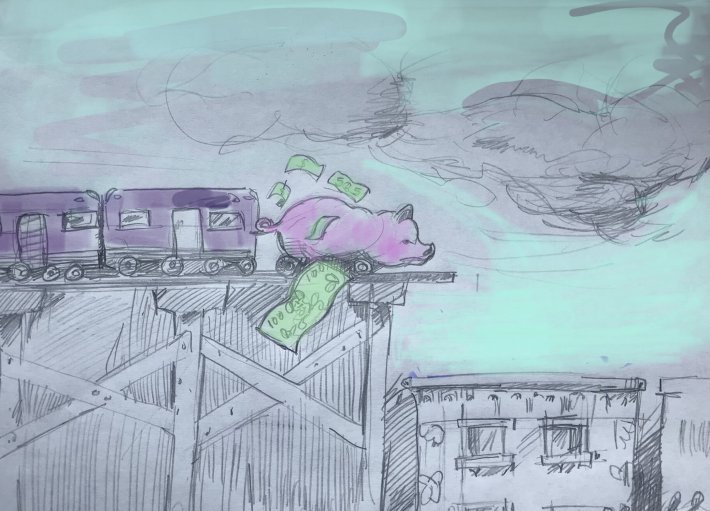
On the bright side, the estimate for the projected public transportation fiduciary chasm for 2026 was recently shrunk from $771 million to $202 million. Still, let's hope politicians don't use that as an excuse to procrastinate any longer about passing legislation to permanently save and improve transit.
But maybe the following interview with northwest-suburban State Rep. Mary Beth Canty (D-54th) will make you feel a bit more optimistic about the odds. Among other observations, she noted that, despite this being the fall veto session, there's a scenario where the bill could be passed without the usual veto-session-required 60 percent supermajority.
This is the tenth, and hopefully final, SBC interview with state lawmakers – representatives and senators, Democrats and Republicans – before transit legislation passes. See links to all the previous conversations at the end of this post.
Side note: The very small subset of Streetsblog Chicago readers who also happen be familiar with Washington, D.C.'s "post-hardcore" music scene may not be surprised by my final question to Rep. Canty. But grunge rock fans will probably be amused by her response.
John Greenfield: You're on the House's Public Transit Working Group group, right?
Rep. Mary Beth Canty: I am.
JG: Do you have any other particular experience or expertise with transit that we should know about?
RMBC: I served for a time on the Regional Transportation Authority board of directors. I was there from July 2020 until I was sworn into the House in January of 2023. So I've seen the good and the bad of what we've currently got, and this is a real passion of mine, making sure that we are bringing transit further out, that we are paying attention to the way that transit has changed, making sure that it is more accessible in the suburbs and in the collar counties and relying less on our hub-and-spokes system. That's the way it's designed now. We shuttle people in and out of Chicago, but that's not the way our world works. We need connectivity all around the region. So that's a driving mission of mine.
So I also serve on the House's Appropriations-Public Safety Committee, and that's where our transit agencies come forward and present their budgets each year, so that was really important to me. And I also serve on the [Transportation: Regulation, Roads & Bridges Committee] in the house, and that is the official committee where we deal with public transportation, our roads, our infrastructure, etc. So this is a topic of a lot of concern to me, because of how important it is to our entire region and our entire state.
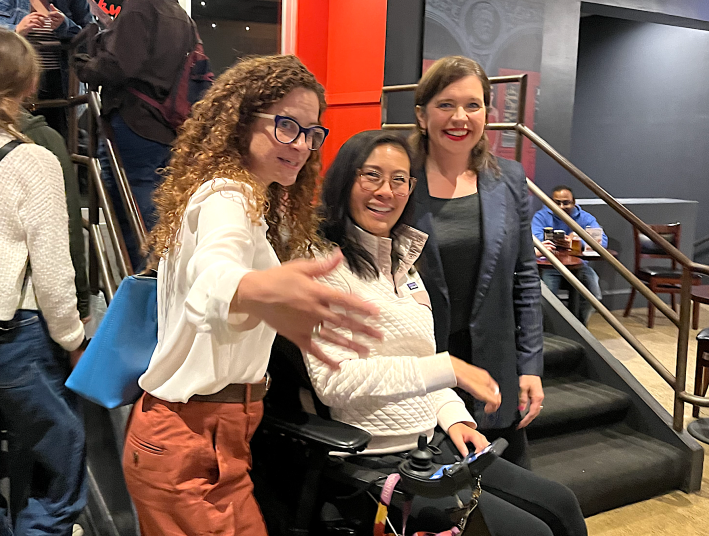
JG: How is your district served by transit? You have Arlington Heights. What are some of the transit services that your constituents use?
RMBC: So I represent parts of Palatine, Arlington Heights, Prospect Heights, Buffalo Grove, Wheeling and Mount Prospect. Within my district I have two different stops on the Union Pacific Northwest Metra Line. I've got Arlington Heights and Arlington Park. We are also predominantly served by Pace, and to a lesser extent, the CTA, particularly when it comes to some bussing services.
But I think what you'll hear [from my constituents] is that they want and need more transit in our area. And I have been committed to making that a priority in the northwest suburbs since I got into public service on my local village board.

JG: I guess transit will become even more important if the Bulls, sorry, the Bears wind up moving to Arlington Heights. [Apologies for misspeaking, but as you'll see later in this interview, as the late Material Issue frontman Jim Ellison used to say, "Rock and roll is my sport."] Then Metra is gonna be really crucial to the area.
RMBC: I do have that property in my district. I will say, transit is important regardless. People in the suburbs deserve the right to hop on a bus, to get from suburb to suburb. They should be able to use transit to get from Buffalo Grove out to Woodfield Mall in Schaumburg, or up to dinner in Kildeer. These are reasonable things for people to expect to be able to do, especially as our world changes. That helps drive even more tourism activity to Chicago, to the surrounding suburbs, and to the collar counties. There's a lot to experience to around here, and the more accessible we can make that to everybody, the better our region does.
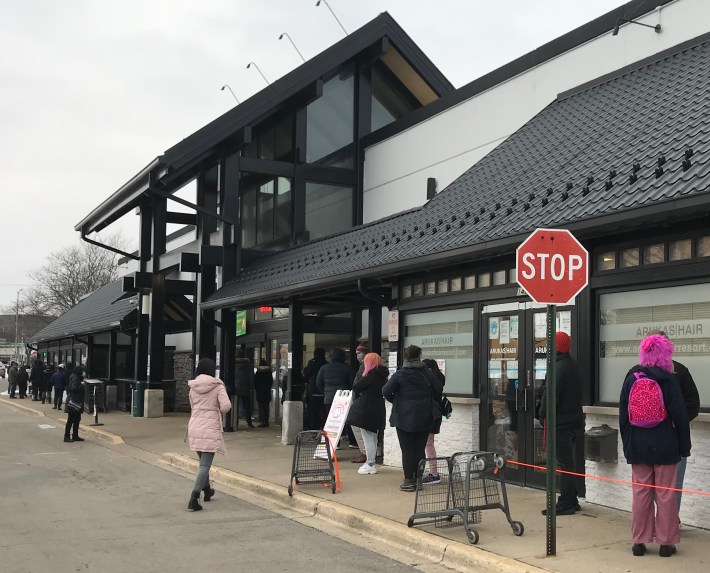
JG: The big news recently about the transit fiscal cliff is that last week, the RTA said their prediction for the 2026 deficit has dropped from $771 million to 202 million. So there's gonna be a lot of temptation for politicians to kick the can down the road again, like they did back in May. Because to get the $1.5 billion a year for transit that transit-friendly Democrats like yourself are pushing for, and that Chicagoland transit agencies and advocates say we need, that's going to be a heavy political lift. That's probably require raising taxes, fees or surcharges.
The Republicans I've talked to, even most of the transit friendly ones, seem like they're pretty much dead-set against that. So how do you think things are looking in terms of what's going to happen during the veto session? What do you think the chances are that the General Assembly will pass a transit funding and reform bill that will include not just the $771 million – I mean, at this point, I guess at this point we only need $202 million to get through next year – but raise $1.5 billion a year to upgrade the system?
I'll add that there's so much crisis going on right now with the Trump stuff that it seems like it's going to be hard to get people's attention and get them on board with raising $1.5 billion a year for transit. So what do you think is going to happen at the veto session?
RMBC: I think everybody is coming into this veto session ready to work, and I think they also know that transit is particularly time-sensitive and necessary. So I think we're all coming in with the mindset of we need to get this done. We need to make a transformational change. We need to make sure that we have a transit system that works both in northeast Illinois and Downstate. We need to make sure that it's well-funded, and that we are set up for a future where we can have expanded uses of transit and start getting rid of our so-called "transit deserts," for lack of a better word. We need to make it more easy to use, accessible, reliable, and then we also need to make sure that we fund it in a fiscally responsible way. And I think everybody's committed to doing that.
JG: OK. It seems like the big differences between transit-friendly Democrats and most of the transit-friendly Republicans I've spoken to is that the Republicans are pretty dead-set against raising fees, taxes, and surcharges.
And here's another thing that the Republicans have complained about. Some of them, who I think are reasonable people – as opposed to some who I think are taking kind of an unreasonable approach – have said they're opposed to the 15 votes overriding five votes plan for the [board of the Northern Illinois Transit Authority board, which would replace the RTA.] They're saying that if the Chicago mayor appointed five directors, the Cook County board president appointed five reps, the governor appointed five reps, and they all want something done, and the five collar county-appointed reps do not want that, then the 15 will be able to override the collar counties.
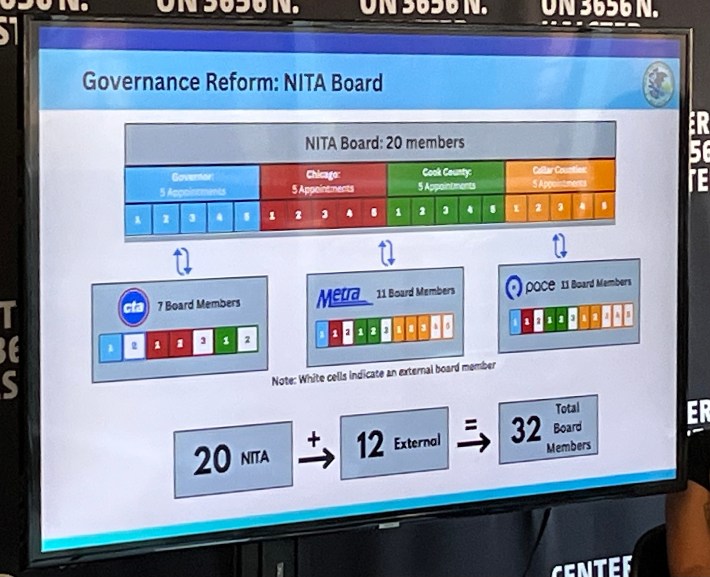
On the other hand, you'd be able to pass something with 12 votes if you get two from each of the four factions.
So do you think that's a reasonable complaint from the collar county Republicans, that they don't think it's fair that they might be overridden? Or do you think that's a reasonable way to do things, to make sure that no one faction is able to stonewall something that everybody else wants?
RMBC: Folks are passionate about this issue, especially in the suburbs and collar counties, where we don't see as much transit, and I think transit can be an afterthought for us. But there are people who are really advocating to make sure that doesn't happen. And I think the transit working group has been diligently working all summer long to make it very clear that we see transit, especially as pertains NITA, specifically the voting structure that you're talking about right now, we see that as a regional area of concern, and we need regional voices, we need to make sure that everybody's voices are heard.
So I don't I don't know that it's fair to characterize whether or not something is reasonable or unreasonable. I think everyone is trying to make sure that their voices are heard at the table, and I think we've been working really diligently to make sure that happens. You know that the working group in the House has a Republican members [Rep. Brad Stephens] who's been been very actively engaged in these conversations. And so when we're able to present that in a more detailed way next week, because these negotiations are ongoing, I think we'll see something that folks can get behind in a bipartisan and bicameral way.
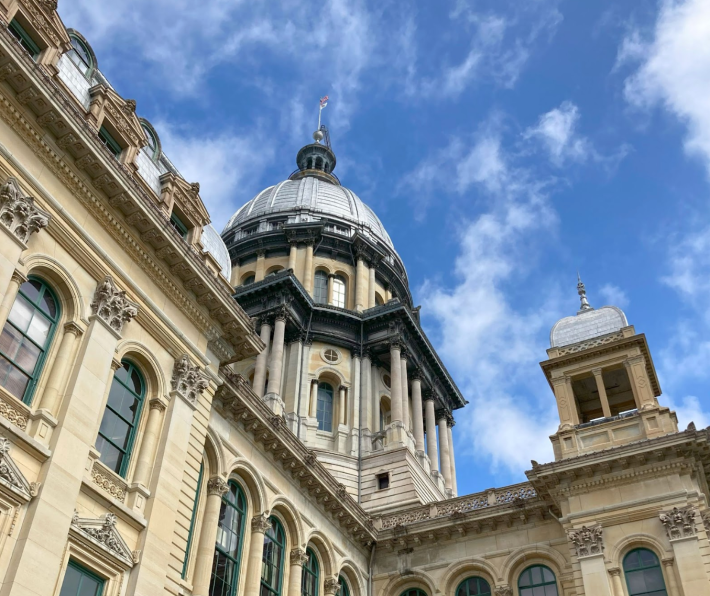
JG: OK. Now if what's proposed involves raising taxes, fees, and surcharges, which most most of the transit-friendly Republicans I've spoken to said they opposed – Brad Stephens said he might be open to something... You need a 60 percent supermajority to pass this during the veto session, right? Is there any possibility that the Democrats might just go ahead and use some muscle and, if so, would you have enough votes to pass the bill, even if there's no Republican support?
RMBC: Well, these conversations are ongoing. And you need a 60 percent super majority if your if your effective date is immediate, right? And I think we are keeping all options on the table for effective dates, immediately or even June 1 of 2026, and I think that's part of our effort to make sure that we are getting this right. It's still urgent, right? We still need to do this in the veto session, but where we can have some ability to work with our colleagues across the aisle and across those chambers, is "What is the thing that will work for most people?" We want as much buy-in as possible. This is a system that has to work for everyone. It's got to work out in the suburbs. We've got to make sure that it works in the city as well. The success of this region is the success of all of us in the entire state. And so we want that buy-in across the aisle and across the chambers, and I'm optimistic that you'll see that in the veto session.
At this point Jake Lewis, the communications consultant who helped set up the interview and was taking part in the call, chimed in.
Jake Lewis: This is a legislative detail that I think is really important. And Mary Beth said this, but I just want to put a point on this. The 60 percent threshold that you're talking about is required in the veto session for bills with an immediate effective date. What Rep. Canty just said is true, which is that if the effective date is June 1 of next year, 2026, then you'd only need a simple majority [51 percent] to pass it. So that is a very important piece of nuance here that can speak to that question of 60 percent versus the simple majority.
JG: Okay, so it would be possible to pass a bill during the veto session without a supermajority, if the legislation doesn't kick in until June 1?
RMBC: Yes.
JG: All right. Well, we're almost out of time, so I'm going to ask you one more question that's very silly, as is my wont, but enquiring minds want to know.
So I think you're the only person I've met in person with the last name Canty. And the only other person I can think of with the last name Canty is Brendan Canty, the drummer for the Washington, D.C.-based punk band Fugazi. No relation are you?
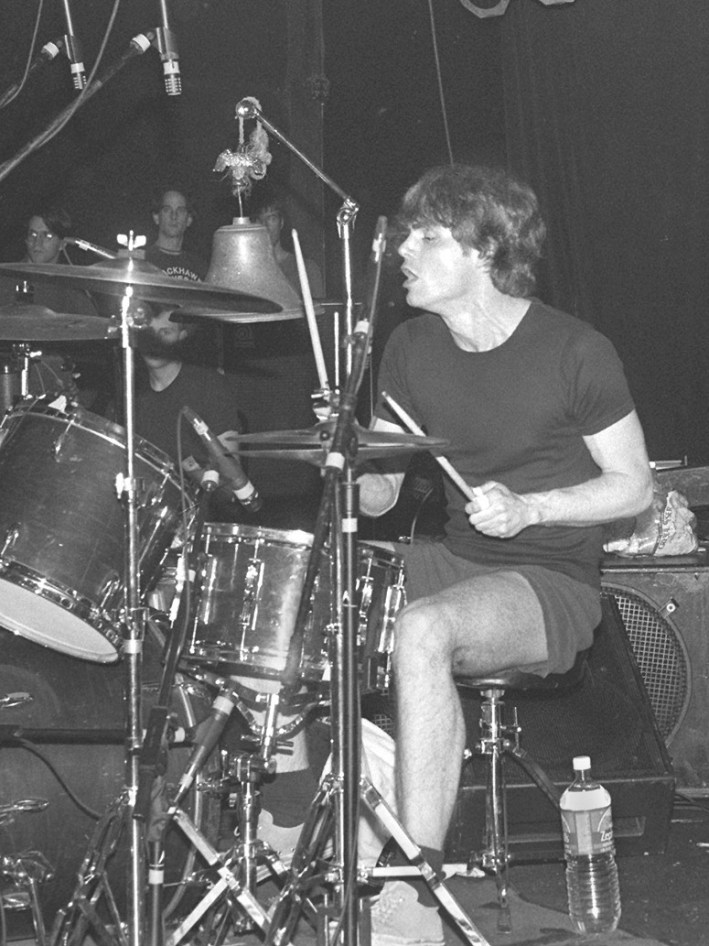
RMBC: As far as I know, I'm not related to him. Though. I will say that Dave Grohl of [Nirvana and] Foo Fighters fame went to high school with my sister [presumably in the D.C. area], so, you know, I do have a rock and roll connection, but not the one that you have identified, as far as I know.
JG: And, to bring things full circle, Dave Grohl got his start in punk rock by seeing his cousin [Tracey Bradford] play with a band [that was opening for Naked Raygun] at the Cubby Bear, across the street from Wrigley Field.
RMBC: I did not know that. I did not know that. [Laughs.]
JG: Yeah, it's a fun story. His cousin was in a band called Verböten. Jason Narducy, who's still very active in music, was in that.
All right, well I think we're about out of time, but you gave some great replies, so I should be able to boil this down into a good article!
Read Streetsblog's interview on this topic with Senate President Don Harmon here.
Read our interview with HB 3438 sponsor Sen. Ram Villivalam on this subject here.
Check out our interviews with State Sen. Mike Simmons and State Rep. Hoan Huynh on the topic here.

Do you appreciate Streetsblog Chicago's paywall-free sustainable transportation reporting and advocacy? We officially ended our 2024-25 fund drive in July, but we still need a little under $43K+ to keep publishing at full strength in 2026. We'd appreciate any leads on potential major donors or grants. And if you haven't already, please consider making a tax-deductible donation to help us continue publishing next year. Thanks!





